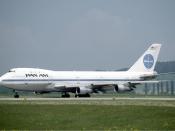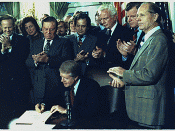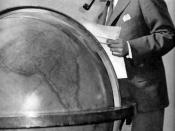1.The importance of airlines to their home countries as a reason for their protection (flag carriers, military considerations)For a long time the airline industry was treated as a special case in the international business. The aviation sector was subjected to different rules and held to different standards.
One reason for this special status was the national defense. Under programs such as the U.S. Civil Reserve Air Fleet (CARF) plan, civilian fleets could be used during times of military action to ferry troops and supplies. Therefore it was vital to insure the existence and health of this civilian reserve. Furthermore national defense was cited as the reason for insisting on home country ownership of these airlines on the premise that home country nationals would or could be made to cooperate in the defense their country.
Today most of these ÃÂFlag CarriersÃÂ are not state-owned anymore. Many of these airlines have been privatised.
And as one can see in the following part, the deregulation of the airline industry led to the fact, that today flag carriers are less important than they were in the past.
2.Deregulation and its impacts2.1.Deregulation of the U.S. Airline IndustryThe history of the airline industry until the 1970s is pretty much related to improving aircrafts and flight conditions. As already mentioned before, in the first half of the twentieth century, this was done with a military focus, because demand for aircrafts came mostly from World War I and World War II. However, in the second half of the century innovations started to spill over to the commercial side and planes to carry passengers started being designed.
Until 1978, the Civil Aeronautics Board (CAB) controlled both, the routes airlines flew and the ticket prices they charged. Their goal was to serve the public interest.
In the...


